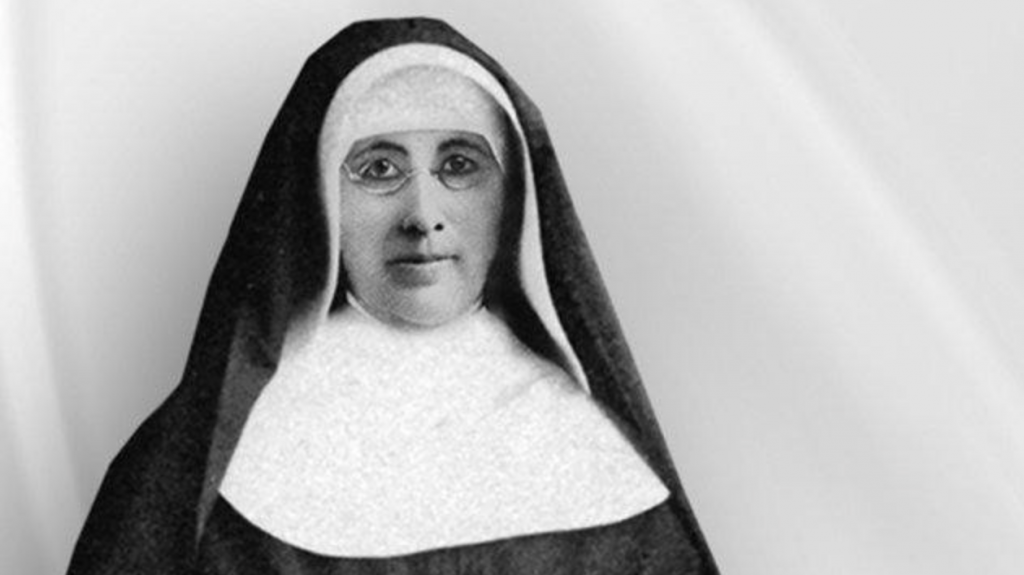My new hero is Mother Alfred Moes. I realize that she is not a household name, even among Catholics, but she should be. She came on my radar screen only after I became the Bishop of the Diocese of Winona-Rochester, where Mother Alfred did most of her work and where she lies buried. Hers is a story of remarkable courage, faith, perseverance, and sheer moxie. Trust me, once you take in the details of her adventures, you will be put in mind of a number of other gritty Catholic Mothers: Cabrini, Teresa, Drexel, and Angelica, to name a few.
Mother Alfred was born Maria Catherine Moes in Luxembourg in 1828. As a young girl, she became fascinated by the possibility of doing missionary work among the native peoples of North America. Accordingly, she journeyed with her sister to the New World in 1851. First, she joined the School Sisters of Notre Dame in Milwaukee but then transferred to the Holy Cross Sisters in La Porte, Indiana, a group associated with Fr. Sorin, CSC, the founder of the University of Notre Dame. After clashing with her superiors—a rather typical happenstance for this very feisty and confident lady—she made her way to Joliet, Illinois, where she became superior of a new congregation of Franciscan sisters, taking the name “Mother Alfred.” When Bishop Foley of Chicago tried to interfere with the finances and building projects of her community, she set out for greener pastures in Minnesota, where the great Archbishop Ireland took her in and allowed her to establish a school in Rochester.
It was in that tiny town in southern Minnesota that God commenced to work powerfully through her. In 1883, a terrible tornado tore through Rochester, killing many and leaving many others homeless and destitute. A local doctor, William Worrall Mayo, undertook the task of caring for the victims of the disaster. Overwhelmed by the number of injured, he called upon Mother Alfred’s sisters to help him. Though they were teachers rather than nurses and had no formal training in medicine, they accepted the mission. In the wake of the debacle, Mother calmly informed Dr. Mayo that she had a vision that a hospital should be built in Rochester, not simply to serve that local community, but rather the whole world. Astonished by this utterly unrealistic proposal, Dr. Mayo told Mother that she would need to raise $40,000 (an astronomical figure for that time and place) in order to build such a facility. She in turn told the doctor that if she managed to raise the funds and build the hospital, she expected him and his two physician sons to staff the place. Within a short span of time, she procured the money, and the St. Mary’s Hospital was established. As I’m sure you’ve already surmised, this was the seed from which the mighty Mayo Clinic would grow, a hospital system that indeed, as Mother Alfred envisioned long ago, serves the entire world. This intrepid nun continued her work as builder, organizer, and administrator, not only of the hospital that she had founded, but of a number of other institutions in southern Minnesota until her death in 1899 at the age of seventy-one.
Just a few weeks ago, I wrote about the pressing need in our diocese for priests, and I urged everyone to become part of a mission to increase vocations to the priesthood. With Mother Alfred in mind, might I take the occasion now to call for more vocations to women’s religious life? Somehow the last three generations of women have tended to see religious life as unworthy of their consideration. The number of nuns has plummeted since the Second Vatican Council, and most Catholics, when asked about this, would probably say that being a religious sister is just not a viable prospect in our feminist age. Nonsense! Mother Alfred left her home as a very young woman; crossed the ocean to a foreign land; became a religious; followed her instincts and sense of mission, even when this brought her into conflict with powerful superiors, including a number of bishops; inspired Dr. Mayo to establish the most impressive medical center on the planet; and presided over the development of an order of sisters who went on to build and staff numerous institutions of healing and teaching. She was a woman of extraordinary intelligence, drive, passion, courage, and inventiveness. If someone had suggested to her that she was living a life unworthy of her gifts or beneath her dignity, I imagine she would have a few choice words in response. You’re looking for a feminist hero? You can keep Gloria Steinem; I’ll take Mother Alfred any day of the week.
So if you know a young woman who would make a good religious, who is marked by smarts, energy, creativity, and get-up-and-go, share with her the story of Mother Alfred Moes. And tell her that she might aspire to that same kind of heroism.

